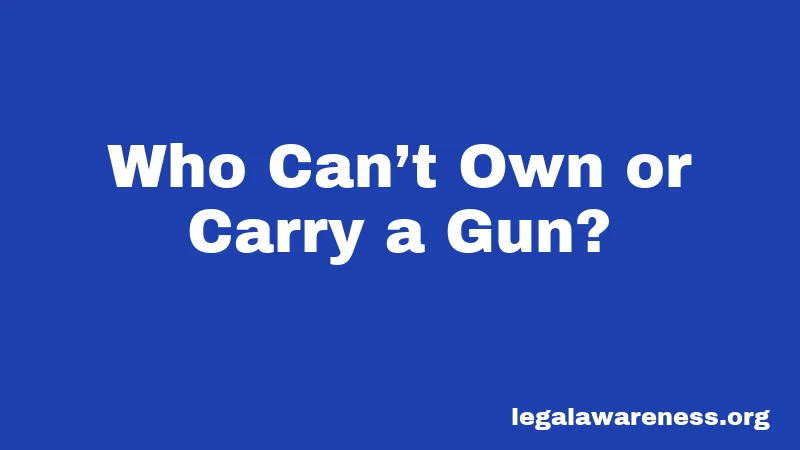Georgia Gun Laws in 2026: What’s Actually Legal
Most people think Georgia’s gun laws are pretty relaxed. And honestly? They’re right. But just because things are looser here doesn’t mean there aren’t rules. Stay with me here—because getting this wrong can cost you big time.
In Georgia, you have way more freedom than most states when it comes to carrying a gun. The big question everyone asks: Can I carry without a permit? The answer changed years ago, and it still surprises people. Let’s break down exactly what you need to know to stay legal and safe.
What’s Legal in Georgia?

Here’s the good news. You can own a gun in Georgia pretty easily. You don’t need to register it. You don’t need to get permission before you buy one. You can even buy from private sellers without a background check (though federal law still has rules about this).
Pretty straightforward, right? Georgia respects the Second Amendment. The state recognizes that people have the right to own firearms for self-defense and hunting. That’s the foundation of Georgia gun law.
But—and this is a big but—there are limits. Not everyone can own a gun. And not everywhere is gun-friendly.
You Don’t Need a Permit Anymore
Here’s where it gets interesting. Back in 2022, Governor Brian Kemp signed something called the “Constitutional Carry Act.” Basically, this meant Georgia residents could carry a firearm without getting a state-issued permit first.
Wondering what this actually means for you? It means you can carry a handgun or long gun in public without going through the licensing process. No waiting period. No background check required (for carry purposes—though federal law still applies to sales).
But hold on. Read this carefully. Not having to get a permit doesn’t mean anything goes. You still have to follow the rules about where you can carry. And you still have to be someone who’s legally allowed to own a gun in the first place.
Who Can’t Own or Carry a Gun?

Not everyone qualifies. Georgia law prohibits certain people from owning or carrying firearms. Here’s the list:
If you’ve been convicted of a felony—any felony, anywhere—you can’t touch a gun. Period. This applies to felonies from Georgia, other states, federal court, or even other countries. This is serious stuff.
Certain misdemeanor convictions also count you out. Specifically, domestic violence convictions block you from gun ownership. If you’ve been convicted of family violence simple assault, for example, you’re done.
You also can’t own a gun if you’ve been ordered to stay away from someone (a restraining order). If a court issues a protection order involving domestic violence, you’re prohibited.
If you’ve been adjudicated mentally ill or deemed dangerous to yourself or others, you’re out. The same goes if you’ve been admitted to a mental hospital against your will.
Here’s another one: If you’re under indictment for a felony, you can’t carry. Even if you haven’t been convicted yet, pending charges count.
Open Carry vs. Concealed Carry
Okay, this gets confusing for a lot of people. Let me break it down.
Open carry means the gun is visible. Everyone can see it. Concealed carry means it’s hidden. You can’t tell you’re carrying.
In Georgia, you can do both. But there’s a twist. For long guns (rifles and shotguns), open carry is legal without anything. Just carry it out in the open. That’s allowed.
For handguns, things are different. You can carry them openly or concealed, but here’s the thing: Technically, you’re still carrying. Some people think this means you need a Weapons Carry License (WCL). Others interpret it differently. It’s honestly one of the most confusing parts of Georgia gun law.
The safest move? If you’re carrying a handgun and want to be absolutely certain you’re legal, get a Weapons Carry License. It costs money and takes a trip to your county probate court, but it clears up any confusion.
You must be at least 21 years old to get a WCL. Military members and honorably discharged veterans can apply at 18.
The Big Restricted Areas

Not sure what counts as a violation? Let me break it down. These places are totally off-limits for guns. It doesn’t matter if you have a permit or think nobody will notice.
Schools and school property—you cannot carry here. This includes K-12 schools and university campuses. The penalties for this are especially harsh because it involves kids.
Courthouses and government buildings are no-go zones. Jails and prisons are obviously off-limits. If you go to the courthouse for jury duty or any other reason, leave your gun at home.
Mental health facilities won’t let you in armed. Bars and alcohol establishments ban guns. Places of worship—churches, synagogues, mosques—are restricted unless the specific place explicitly allows it.
Hospitals won’t allow firearms. Nuclear power facilities are completely forbidden. Commercial airport terminals have restrictions too, especially past certain security checkpoints.
If a private business posts a “no firearms” sign, you’re supposed to respect that. Not all signs have legal force, but better safe than sorry. If asked to leave, you need to leave or face trespassing charges.
Confused about the difference? Here’s what matters: If a place is specifically mentioned in Georgia law as off-limits, you’re breaking the law if you carry there. If it’s just posted but not in the law, you still need to leave if asked—but it’s less legally serious.
The Penalties—and They’re Harsh
So what happens if you break these laws? The consequences range from annoying to life-changing. Seriously.
Carrying a firearm in a restricted area where it’s prohibited? That’s usually a misdemeanor. You could face up to 12 months in jail and fines. For a first offense, you might get away with smaller consequences, but it goes on your record.
Here’s where it gets serious. If you’re a convicted felon and you possess a firearm, that’s a felony. You’re looking at 1 to 10 years in prison and fines up to $10,000. This isn’t a joke. Many people face much longer sentences, especially if they have prior convictions.
Carrying a concealed handgun without a license used to be a felony too. Penalties were 2 to 5 years in prison plus fines. These laws are still on the books for certain situations.
If you use a firearm while committing another crime—like armed robbery—the penalties get way worse. You’re not just facing robbery charges. You’re facing enhanced firearms charges on top of it. We’re talking multiple years in prison.
Second or subsequent violations make things even worse. If you’re convicted of a gun crime and then get in trouble again within five years, charges that might have been misdemeanors can become felonies.
The long-term damage goes beyond jail time and fines. A gun conviction stays on your record forever. It affects job prospects, housing applications, and your ability to own firearms in the future. You can potentially restore rights through expungement or a pardon, but it’s complicated and doesn’t always work.
Stand Your Ground—You Can Defend Yourself
Georgia has what’s called a “Stand Your Ground” law. This is important because it affects how you can legally use a firearm for self-defense.
Basically, if someone is threatening you with violence, you don’t have to run away. You have the right to stand your ground and use force—including deadly force—to protect yourself.
But there’s a catch. You have to be in a place where you have a legal right to be. You can’t use deadly force if you’re trespassing or breaking the law yourself.
There also has to be a clear, immediate threat. You can’t just assume someone’s dangerous. The threat needs to be real and obvious. You need to believe force is necessary to prevent death, serious bodily harm, or to prevent someone else from being harmed.
Georgia also recently updated its self-defense laws. Now, people who use justifiable force are generally immune from criminal prosecution and civil lawsuits. That means if your use of force was legal and justified, you can’t be charged or sued for it.
Think of it like this: You’re at a gas station. Someone tries to rob you with a knife. You have a gun and shoot in self-defense. Under Georgia law, you shouldn’t be charged because you were defending yourself in a place you had the right to be.
Getting a Weapons Carry License
Want to be extra safe? Get a WCL. It makes things crystal clear and removes most doubt about whether you’re legal.
You need to be 21 years old (or 18 if you’re military). You need to be a Georgia resident. You can’t be prohibited from owning a gun for the reasons we talked about earlier.
Here’s the good part: You don’t need firearms training. You don’t need to pass a test. You don’t need to prove you can shoot. You just need to apply and meet the basic requirements.
Go to your county’s probate court. They’ll process your application. There’s a fee—usually around $20 or so, but check with your county. Once approved, you get your license.
Georgia honors concealed carry permits from other states too. So if you move to Georgia from another state with a valid permit, you can usually carry here while you sort out getting a Georgia license.
Important Reminders About Carrying in Your Car
Here’s something that trips people up constantly. Can you carry a gun in your car? Yes. But with conditions.
You can have a loaded rifle or shotgun in your vehicle. You can carry a handgun too. But here’s where people mess up: If you leave your gun in plain sight in an unlocked car, you’re asking for trouble. It’s not just illegal in some cities—it’s a really easy way to get your gun stolen.
One recent Georgia court case ruled that a city ordinance banning unlocked guns in cars violated state law. But just because you legally can leave a gun visible in an unlocked car doesn’t mean it’s a good idea. Your gun can be stolen. Then you might face charges for not reporting it missing.
If you’re traveling between states with a firearm, be super careful. Federal law says firearms must be unloaded, locked in a container, and separated from ammunition. Check the specific rules of every state you’re passing through. What’s legal in Georgia might be very illegal in the next state.
What About Other States?
Here’s something important to know. Georgia gun laws don’t apply outside Georgia. If you’re traveling to another state with your firearm, that state’s laws take over completely.
Some states honor Georgia’s permits. Others don’t. Some states are way stricter. One state might ban the exact gun that’s perfectly legal in Georgia.
Before traveling, look up the specific laws of every state you’re visiting. Ignorance isn’t a defense. Just because it’s legal here doesn’t mean you won’t face serious federal charges somewhere else.
Frequently Asked Questions
Do I have to tell a police officer I’m carrying a gun?
No. Georgia law doesn’t require you to announce that you’re armed. If an officer asks directly, you should be honest. But you don’t have to volunteer the information.
Can my employer ban guns in the workplace?
Yes. Private businesses can set their own rules about firearms on their property. If your employer posts a no-guns policy, you need to follow it or not work there.
What about ghost guns (guns without serial numbers)?
This is changing. Some areas are restricting ghost guns. Federal law is also evolving. Check current laws before trying to build or buy one.
Can I carry a gun on my own property?
Absolutely. Your home, your property, your business—you can carry however you want on your own land (as long as you’re allowed to own a gun in the first place).
What happens if I accidentally bring a gun to a restricted place?
Accidentally carrying into a gun-free zone is still a violation. However, if you realize your mistake immediately and leave without incident, you might have a better defense. But don’t count on it. Always know where your gun is.
Final Thoughts
Georgia’s gun laws are genuinely more permissive than most states. You get real freedom here. But freedom comes with responsibility. The rules about where you can carry, who can own guns, and what happens when you mess up are serious business.
The penalties for violating Georgia gun laws can wreck your life. Prison time, hefty fines, losing your gun rights permanently, and a criminal record that follows you forever. It’s not worth taking chances.
When in doubt, ask a lawyer. Seriously. If you’re unsure about a specific situation, consult with a criminal defense attorney before you carry your gun into it. It costs way less than fighting a gun charge in court.
Stay informed, stay legal, and stay safe.
